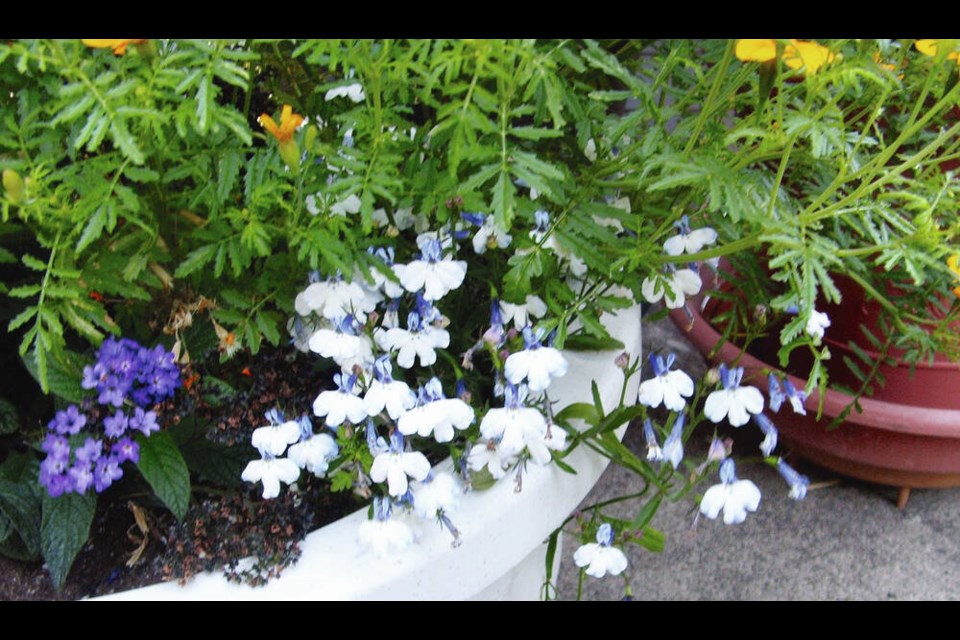Early every year I keep in touch with as many of my regular seed sources as possible by making at least small orders. In the past few weeks I’ve been scanning print and online listings with special attention to unearthing alternative sources for some of the varieties I’ve counted on finding in the catalogue from Stokes Seeds, a company that now has a minimum order level of $125, plus shipping and taxes.
So far, the catalogue that most closely approximates the extensive Stokes listings of pansies, violas and petunias is the one from Lindenberg Seeds in Manitoba.
Their catalogue arrives later than most, in the third week of January, and they do not have online ordering yet, but the prices are lower than any other source I know.
Lindenberg has a page and a half packed full of pansy varieties and offers violas, listed separately, in both the Sorbet and Endurio Series. I’ve chosen Sorbet Coconut Swirl, a lovely combination of violet-blue and white.
Among the pansies, I was impressed enough by Pink Blotch in the Karma series last year to order three more colours in the series. Unlike the usual pansy and viola pattern of staging a slow melt-down in the warmth of May, Pink Blotch continued blooming all summer.
Violas produce smaller flowers, often in greater abundance, than pansies. The plants are also usually smaller, and generally more cold-tolerant. I seed pansies and violas this month for spring flowers and again around mid-July for flowers from early autumn through spring.
Among all the seed sources I use, Lindenberg is the only one listing my favourite trailing lobelia — Blue Splash in the Regatta Series. It is an early and profuse bloomer with blue and white blossoms that are nice accents in planters and hanging baskets.
Muffins and the outdoor pantry. Around this time every year I begin to dig and use the last of the carrots left out in the garden, well preserved in the cool, moist soil. Their plot needs to be emptied and replenished with compost, fertilizer and lime (except for potatoes) in preparation for early spring plantings.
In most years, this means an abundance of carrots to use. I often make a series of carrot cakes using an easy recipe popular in the family since the children were young. Grated carrots in a blend of equal parts fresh lemon juice and olive oil, with a few currants added, is a refreshing salad, appreciated by that vital human organ, the liver.
I’ve just stumbled upon another recipe that is destined to become a healthy staple in my diet.
I’ve never been a big fan of muffins, but as I passed by the deli section in a local health food store recently some dark, rich looking muffins caught my attention. They were labelled “Morning Glory Muffins.” I asked the baker what was in them. Her reply: “Just about everything — grated carrots and apple, crushed pineapple, coconut flakes, nuts and raisins along with the usual oil, eggs, flour, sugar and flavourings.
I found a recipe for Morning Glory Muffins with all those ingredients included, and made them, using half of the sugar in the recipe and doubling the amount of cinnamon.
The recipe makes a whopping 18 muffins. They freeze well, and are a delicious snack on their own or eaten with jam, jelly or cheese. The recipe is at .
GARDEN EVENTS
Qualicum meeting. The Qualicum Beach Garden Club will meet on Wednesday, Feb. 21, at 7:30 p.m. in the QB Civic Centre, 747 Jones St. Bonnie Zand will speak about Integrated Pest Management and strategies for managing garden pests while conserving beneficial insects living in the garden. .
Pruning demonstration. Dinter Nursery, 2205 Phipps Rd. in Duncan, is presenting a demonstration of basic fruit tree and small fruit pruning with Bernie Dinter on Saturday, Feb. 24, from 10 to 11 a.m. The demonstration is free of charge. No registration is required. It will take place outdoors. Please dress warmly.
Seedy in Victoria. Seedy Sunday is back in Victoria on Feb. 25, 10 a.m. to 2 p.m. in the Quadra Village Community Centre and Neighbourhood Gym, 901 and 950 Kings Rd. This family-friendly celebration of seeds offers garden-themed activities for children and is an opportunity to buy locally grown, climate-adapted seeds and plants, exchange garden-grown seeds with other gardeners, and attend free workshops.



